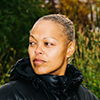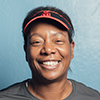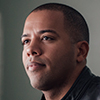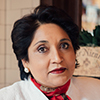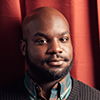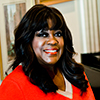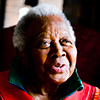



Alcaraz, 44, is the executive director of the Chicago Abortion Fund, which provides medical referrals and funds to low-income women who need abortion services.
Interview by Ben Joravsky
Photos by Ryan Lowry

I grew up on the south and north sides. We moved to Lincoln Park when I was in high school. I wound up graduating from Queen of Peace High School in Burbank. And I got my undergraduate and graduate degrees from DePaul. So, ironically speaking, you can say I’m Catholic all the way.
In high school, I was a shy kid. I was not in the popular crew. I pretty much hung to myself. We were really poor. But I also had a little rebel in me.
The high school I went to was majority white. There was a lot of racism. I remember one teacher talking about who was going to bring what for International Food Day. He said, “Gaylon, you bring the fried chicken and the watermelon.” I looked at him and said, “That’s not what I eat.” I got up and walked out of the classroom.

I viewed myself as a black girl. I knew my father was Mexican. But I wasn’t as aware of my identity as I am now. I grew up in the 80s, and I listened to all kinds of music from that time. Rick Springfield, the Police, Journey. But I also listened to house music. I’d be sneaking out of my house to get to those house parties. So I absorbed a lot of different cultures.
I started getting radical in the 90s. I had that kind of spirit in me. I’d read something in the newspaper that would get me upset, and I’d write a letter to the editor. I didn’t even have a computer back then. I’d go to the public library over in Belmont Cragin and use their computers to write those letters.
I was not particularly connected to the abortion rights movement when I took this job. It was more like I needed a job, so I applied. That was in 2005. But I believe in the cause. I believe in women controlling the bodies they live in. So I found the right job.

We help marginalized women pay for their second-trimester abortion procedures. We also do a lot of advocacy training, trying to make sure that policy makers understand the importance of reproductive justice. What does that mean? That means this is greater than abortion rights. If a woman doesn’t have a livable wage, that impacts her reproductive rights because she can’t afford an abortion. Or if she lives in a criminally dangerous neighborhood where she can get sexually assaulted—that obviously impacts her reproductive rights. What if she doesn’t have access to sexual education at school? How will she learn about her body?
It’s not just abortion for marginalized women that we’re for—it’s about affordable housing, good schools, safe, affordable neighborhoods, and adequate health care. It’s also about your right to carry your pregnancy to term and parent the children you have with adequate support in place.
We want to amplify the voices of the women we are serving. You look at the pro-choice movement and you can count on one hand how many women of color have been included in leadership. That has to change.


I’ve been targeted for my work. They call. They e-mail. They try to post comments. They’ve gotten up in my face outside of clinics. It’s the usual crew of old, white men. I remember this one scene outside a clinic. They were waving a bloody poster. We’re told not to engage with them. It just agitates the situation and makes the patient coming in more fearful. But I saw that poster and it got to me. So I walked up to the guy and said, “Why are you showing that?” He said, “This is about the sanctity of life.” I said, “Are you serious? That’s just propaganda. Do you even know where that picture comes from?”
He couldn’t answer. He didn’t have an answer.
I think the majority of people in the United States think that women should be able to make their own decisions about abortion. At the same time, the pro-choice movement is losing ground. Social movements tend to be reactive, and we’re not proactive enough. We have to do a better job. The anti-choice movement has been very effective in relaying an emotional message. And they back up candidates who do whatever they’re told to do. So we have to be more proactive in the political arena as well.

It’s sort of a similar thing with the LGBT community. I can tell you the issues that affect gays and lesbians of color are not always addressed.
There’s a lot of work being done on marriage equality. Of course I believe in marriage equality. Who would not want people who love each other to be able to marry each other? But let’s be honest, that’s a very classist issue. It’s people with money who drove that issue.
Even if you allow everyone to get married, you still have communities of color that don’t have health care. Or they can’t land jobs. Or they’re living in poverty. OK, so now they can get married. But if you ask someone who’s poor “Would you rather have marriage equality or a job?”—which one do you think they’re going to pick?
It’s a struggle. But I’m still dedicated.



